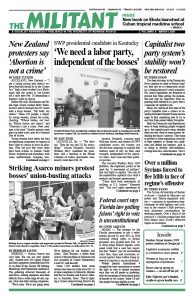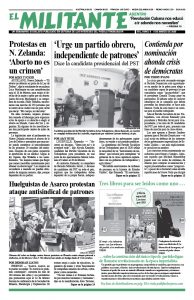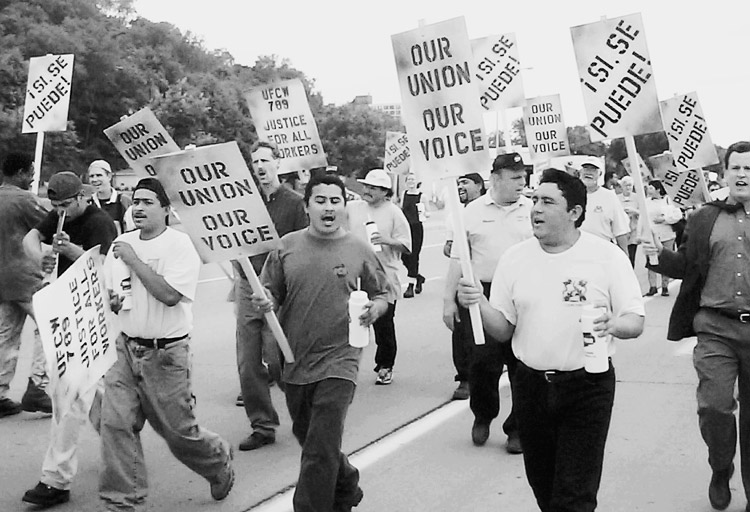Below is a chapter from The Turn to Industry: Forging a Proletarian Party by Socialist Workers Party National Secretary Jack Barnes. It is entitled, “Communism Is Not a Doctrine but a Movement.” Copyright © 2019 by Pathfinder Press. Reprinted by permission.
What is Marxism? What are we all about?
In October 1847, as part of his preparation together with Karl Marx to draft the Communist Manifesto two months later, Engels wrote a couple of editorials responding to a petty-bourgeois German socialist named Karl Heinzen (whose place in history lies in the fact that he served as a foil for Marx and Engels).
“Herr Heinzen imagines communism is a certain doctrine which proceeds from a definite theoretical principle as its core and draws further conclusions from that,” Engels wrote.
“Herr Heinzen is very much mistaken. Communism is not a doctrine but a movement; it proceeds not from principles but from facts.” That’s where the proletarian party’s program comes from, Engels said.
Marx and Engels incorporated this central concept at the heart of the Communist Manifesto, which they had been asked to draft at the founding congress of the world’s first modern revolutionary workers organization, the Communist League, held in London in December 1847.
“The theoretical conclusions of the communists are in no way based on ideas or principles that have been invented, or discovered, by this or that would-be universal reformer,” they wrote. “They merely express, in general terms, actual relations springing from an existing class struggle, from a historical movement going on under our very eyes.”
Marxism is “simply” the generalized interests, written down, of one of the two major classes involved in that struggle in the modern world — the working class.
Communists “have no interests separate and apart from those of the proletariat as a whole,” Marx and Engels wrote in the Communist Manifesto. “They do not set up any sectarian principles of their own, by which to shape and mold the proletarian movement.”
Marx and Engels went on to pinpoint the internationalism of the communist movement, and its task in overcoming the national and other divisions imposed by capitalism on the working class.
“The communists are distinguished from the other working-class parties by this only,” they say: “(1) In the national struggles of the proletarians of the different countries, they point out and bring to the front the common interests of the entire proletariat, independently of all nationality. (2) In the various stages of development which the struggle of the working class against the bourgeoisie has to pass through, they always and everywhere represent the interests of the movement as a whole.”
Marx and Engels conclude: “The communists, therefore, are on the one hand, practically, the most advanced and resolute section of the working-class parties of every country, that section which pushes forward all others; on the other hand, theoretically, they have over the great mass of the proletariat the advantage of clearly understanding the line of march, the conditions, and the ultimate general results of the proletarian movement.”
Marxists are part of the working class, not something outside of it. The revolutionary Marxist party analyzes all classes and their conflicts, all politics, from the point of view of the historic goals of our class — the class we are simply the most conscious and organized part of and the most consistent fighter for. The class whose task is to govern, expropriate the exploiters and oppressors, and lead a great social movement to reorganize society to eliminate oppression and lay the foundations of a socialist society — changing ourselves utterly in the process.
The revolutionary working-class leader Malcolm X explained this transformation through struggle with exemplary clarity only a few weeks before his assassination in February 1965. A reporter asked him: Was his goal to “wake [African Americans] up to their exploitation?” Malcolm replied, “No, to their humanity, to their own worth.”
The working class is created by its enemy — the capitalist class, the profit system. Workers don’t choose to participate in the class struggle, we are forced to by our condition. By the fact that our tools, our use of the land, not only “forty acres” but the “mules” are taken from us.
This is what makes Marxism scientific, not utopian. And more and more workers in this country are becoming conscious of this class struggle as the rulers’ offensive escalates — every day in the factories, and around the big social and political issues such as unemployment, discrimination, and war.
No wonder Marx and Engels wrote — in one of their earliest works, more than two years before workers recruited them to the world’s first modern communist party — that there comes a stage in capitalist social relations “when productive forces … are brought into being” that “are no longer productive but destructive forces.”
This communist perspective and strategy for working-class independence and political power — that’s all Marxism is. Of course, that “all” encompasses the future of humanity: the transformation of the great mass of humanity and the salvation of our planet from capitalism’s “forces of destruction” and from the devastation of our conditions of life and work.


